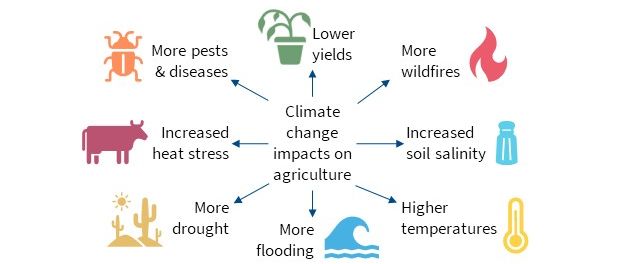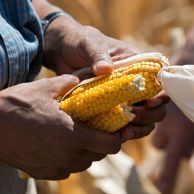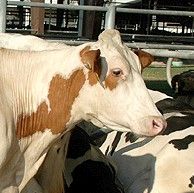Agricultural biotechnology can be an important tool for addressing the causes and consequences of climate change and for achieving important societal goals such as reduced poverty, improved global food security, and reduced environmental impacts from agriculture. That’s why agricultural biotechnology is part of USDA’s toolkit for a healthy planet and sustainable future.
Causes and impacts of climate change
Human influence on the climate through emission of greenhouse gases is clear. In the U.S., agriculture and forestry contributed an estimated 10.5% of greenhouse gas emissions in 2018 (USDA-ERS). Impacts of climate change on agriculture include increased temperatures and increased incidence or severity of extreme weather events.

Mitigating and adapting to climate change

Agricultural biotechnology provides ways to both mitigate and enhance adaptation to environmental changes. Products developed with agricultural biotechnology may contribute to the reduction of greenhouse gas emissions, such as cover crops that provide sustainable biofuels, fruits and vegetables that stay fresh longer and reduce food waste. Researchers are also developing ways to draw excess carbon dioxide out of the atmosphere with trees and even microbes.
Using agricultural biotechnology, plant and animal breeders can more quickly develop plants and animals that are adapted to changing environmental conditions, such as drought, increased temperatures, new diseases, and other stressors.

For example, plant breeders are using agricultural biotechnology to develop drought-tolerant crops including wheat, rice, tomato, soybean, and cotton. Drought-tolerant corn, including certain varieties developed with genetic engineering, is already being grown across drought-prone areas in the United States. Drought-tolerant wheat is approved for use in Argentina and Brazil.
Animal breeders are using agricultural biotechnology, including genome editing, to develop heat-tolerant cattle that are better able to regulate body temperature during hot conditions. These cattle have reduced heat stress, due to shorter hair and metabolic changes.
Creating a more sustainable world

In addition to helping to mitigate and adapt to climate change, application of agricultural biotechnology can help advance the sustainability of food systems. The United States is a leader in agricultural research and development to improve productivity and promote climate-smart use of natural resources in agriculture.
Through evidence-based innovation and science, including agricultural biotechnology, we can expand the toolbox for farmers, fishers, and other producers to produce more with less – less land, less water, fewer inputs and resources. Innovative and creative solutions are necessary for food systems to keep pace with evolving needs and challenges. Increasing agricultural productivity can reduce agriculture’s environmental impacts, and also alleviate poverty, improve food security and nutrition, and raise standards of living.
